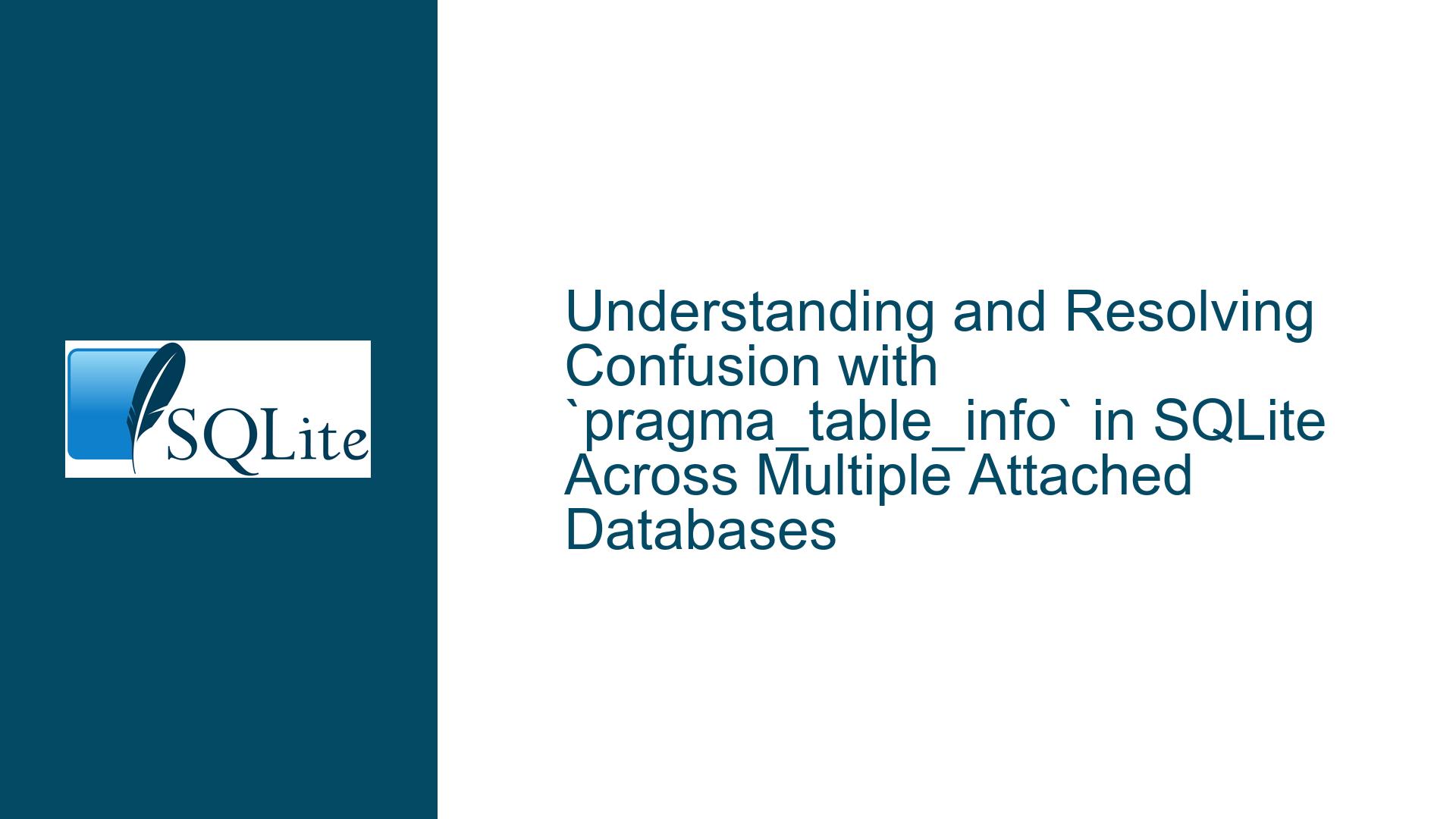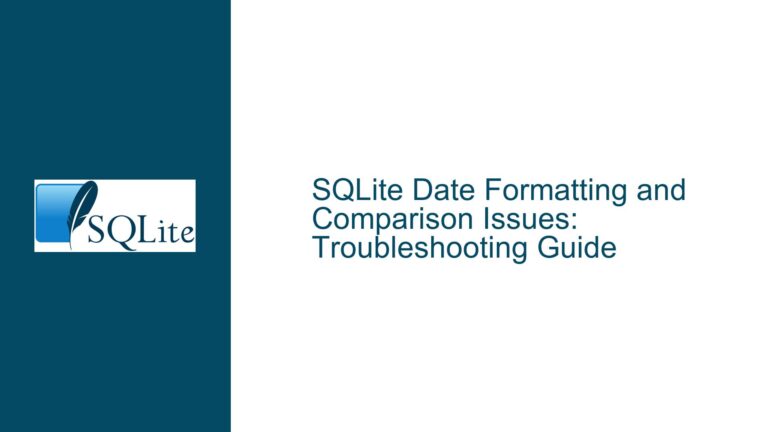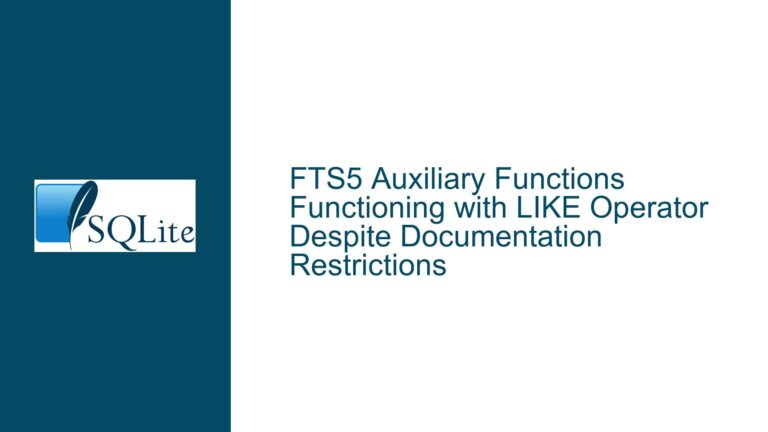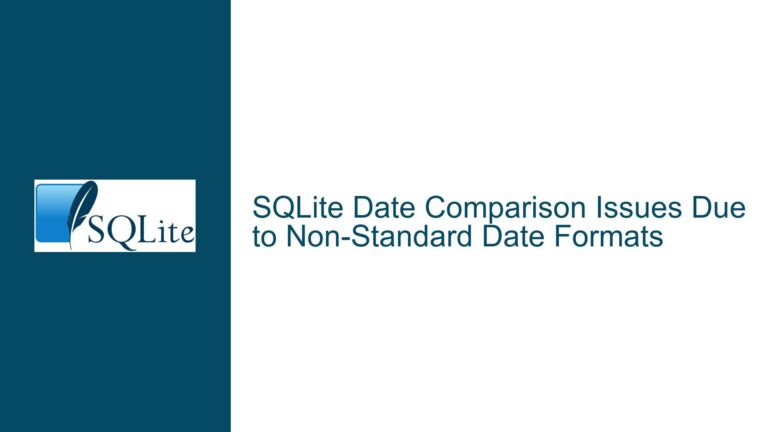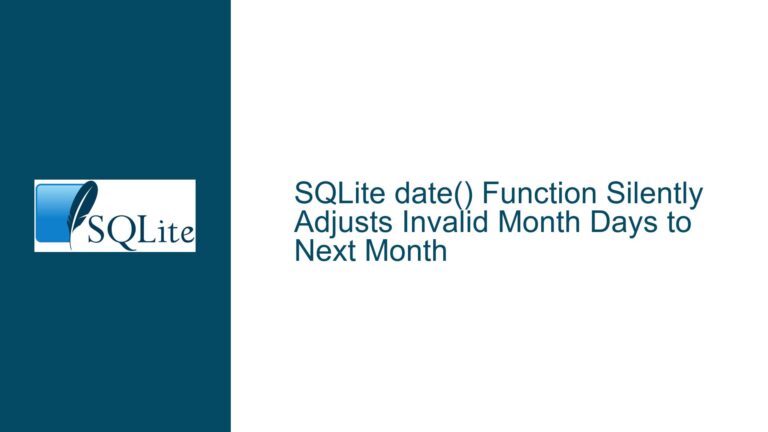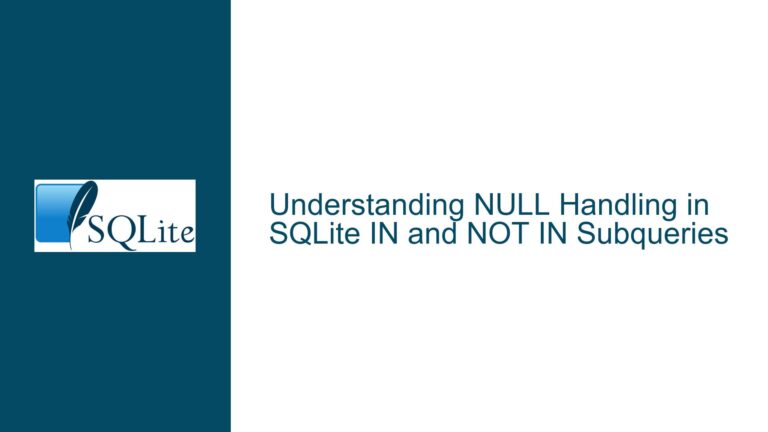and Resolving Confusion with `pragma_table_info` in SQLite Across Multiple Attached Databases
Issue Overview: Confusion with pragma_table_info Across Attached Databases
When working with SQLite, particularly in scenarios where multiple databases are attached to a single in-memory database, understanding how to retrieve table metadata using pragma_table_info can become confusing. The confusion arises primarily due to the interaction between the attached databases and the way pragma_table_info interprets its arguments. Specifically, the issue manifests when attempting to query table information from different attached databases, such as store and arch, both containing a table named TEST.
The confusion is evident in the following scenarios:
- Executing
select * from arch.pragma_table_info('TEST')results in an error, whileselect * from store.pragma_table_info('TEST')works correctly. - Using
pragma arch.table_info('TEST')andpragma store.table_info('TEST')both work as expected. - Running
select * from pragma_table_info('TEST')orpragma table_info('TEST')returns information from thestoredatabase, which is not immediately clear to the user.
This behavior can lead to misunderstandings about how pragma_table_info operates, especially when dealing with multiple attached databases. The root of the issue lies in the way SQLite handles function calls and schema references within the context of attached databases.
Possible Causes: Schema Ambiguity and Function Scope in SQLite
The confusion surrounding pragma_table_info in the context of multiple attached databases stems from two primary factors: schema ambiguity and the scope of SQLite functions.
Schema Ambiguity:
In SQLite, when multiple databases are attached, each database is assigned a schema name. For example, if you attach two databases named store and arch, they are referenced as store and arch respectively. However, when querying table information using pragma_table_info, the schema must be explicitly specified to avoid ambiguity. Without explicit schema specification, SQLite defaults to the main database or the first attached database, leading to unexpected results.
Function Scope:
SQLite functions, including pragma_table_info, do not inherently belong to a specific schema. Instead, they are globally available across all attached databases. This means that when you call pragma_table_info, SQLite does not automatically associate the function call with a specific schema unless explicitly instructed. This global scope can lead to confusion when attempting to retrieve table information from a specific attached database.
The interaction between schema ambiguity and function scope is further complicated by the syntax used to call pragma_table_info. For example, select * from arch.pragma_table_info('TEST') is incorrect because pragma_table_info is not a table or a schema-specific function. Instead, the correct approach is to use the function call syntax with an explicit schema parameter, such as select * from pragma_table_info('TEST', 'arch').
Troubleshooting Steps, Solutions & Fixes: Clarifying pragma_table_info Usage Across Attached Databases
To resolve the confusion and ensure accurate retrieval of table information across multiple attached databases, follow these troubleshooting steps and solutions:
1. Use the Correct Function Call Syntax:
The primary issue arises from incorrect syntax when calling pragma_table_info. Instead of using schema-specific prefixes like arch.pragma_table_info, use the function call syntax with an explicit schema parameter. For example:
select * from pragma_table_info('TEST', 'arch');
select * from pragma_table_info('TEST', 'store');
This approach ensures that SQLite correctly identifies the schema from which to retrieve the table information.
2. Understand the Global Scope of Functions:
Recognize that SQLite functions, including pragma_table_info, are globally available across all attached databases. This means that the function itself does not belong to any specific schema. Instead, the schema must be specified as a parameter within the function call. For example:
select * from pragma_table_info('TEST', 'arch');
select * from pragma_table_info('TEST', 'store');
These calls are equivalent in meaning and will return the correct table information for the specified schema.
3. Use Virtual Table Syntax for Advanced Filtering:
If you need to filter results based on schema or other criteria, you can use the virtual table syntax for pragma_table_info. For example:
select * from pragma_table_info('TEST') where schema = 'store';
select * from pragma_table_info where arg = 'TEST' and schema = 'arch';
This approach allows for more advanced filtering and can be particularly useful when working with complex queries involving multiple attached databases.
4. Explore Additional Metadata with table_xinfo:
For more detailed table information, including hidden columns, consider using table_xinfo instead of table_info. For example:
pragma table_xinfo('pragma_table_xinfo');
This command returns additional metadata from the internal data dictionary, providing a more comprehensive view of the table structure.
5. Verify Schema References:
Ensure that all schema references are correctly specified in your queries. For example, when attaching databases, use consistent and meaningful schema names:
attach database 'store.db' as store;
attach database 'arch.db' as arch;
This practice helps avoid confusion and ensures that schema references are clear and unambiguous.
6. Test Queries in Isolation:
When troubleshooting, test each query in isolation to verify its behavior. For example:
select * from pragma_table_info('TEST', 'arch');
select * from pragma_table_info('TEST', 'store');
By testing each query individually, you can identify any discrepancies and ensure that the correct table information is being retrieved.
7. Consult the Documentation:
Refer to the SQLite documentation for the latest information on pragma_table_info and related functions. The documentation provides detailed explanations of function behavior, syntax, and usage examples.
8. Update to the Latest SQLite Version:
Ensure that you are using the latest version of SQLite, as updates may include improvements and clarifications related to pragma_table_info and schema handling.
9. Leverage Community Resources:
Engage with the SQLite community through forums, mailing lists, and other resources to share insights, ask questions, and learn from others’ experiences. Community feedback can provide valuable perspectives and solutions to common issues.
10. Document Your Findings:
As you troubleshoot and resolve issues, document your findings and solutions for future reference. This practice helps build a knowledge base that can be shared with colleagues and used to streamline future troubleshooting efforts.
By following these steps and solutions, you can effectively resolve the confusion surrounding pragma_table_info in SQLite and ensure accurate retrieval of table information across multiple attached databases. Understanding the nuances of schema handling and function scope is key to mastering SQLite and leveraging its full potential in your database projects.
